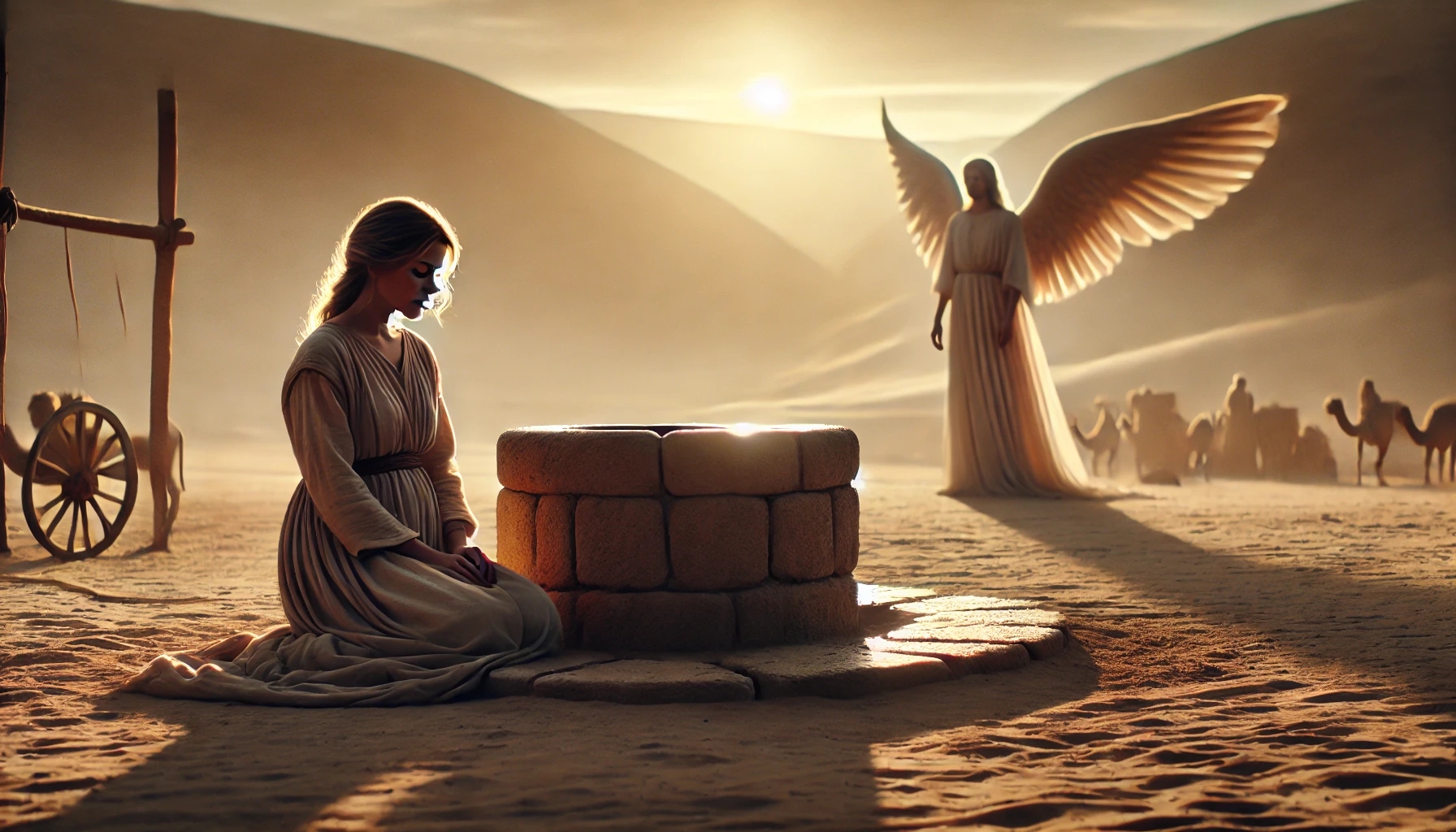2.05.2025 – Genesis Chapter 16 | BELIEVE HIS PROPHETS

📅 May 2, 2025
📖 DAILY BIBLE READING
✨ Genesis 16 – When Human Plans Fail, God’s Grace Speaks
══════════════════════════════════════════════
📜 Bible Text – Genesis 16 (KJV)
1 Now Sarai Abram’s wife bare him no children: and she had an handmaid, an Egyptian, whose name was Hagar.
2 And Sarai said unto Abram, Behold now, the Lord hath restrained me from bearing: I pray thee, go in unto my maid; it may be that I may obtain children by her. And Abram hearkened to the voice of Sarai.
3 And Sarai Abram’s wife took Hagar her maid the Egyptian, after Abram had dwelt ten years in the land of Canaan, and gave her to her husband Abram to be his wife.
4 And he went in unto Hagar, and she conceived: and when she saw that she had conceived, her mistress was despised in her eyes.
5 And Sarai said unto Abram, My wrong be upon thee: I have given my maid into thy bosom; and when she saw that she had conceived, I was despised in her eyes: the Lord judge between me and thee.
6 But Abram said unto Sarai, Behold, thy maid is in thine hand; do to her as it pleaseth thee. And when Sarai dealt hardly with her, she fled from her face.
7 And the angel of the Lord found her by a fountain of water in the wilderness, by the fountain in the way to Shur.
8 And he said, Hagar, Sarai’s maid, whence camest thou? and whither wilt thou go? And she said, I flee from the face of my mistress Sarai.
9 And the angel of the Lord said unto her, Return to thy mistress, and submit thyself under her hands.
10 And the angel of the Lord said unto her, I will multiply thy seed exceedingly, that it shall not be numbered for multitude.
11 And the angel of the Lord said unto her, Behold, thou art with child and shalt bear a son, and shalt call his name Ishmael; because the Lord hath heard thy affliction.
12 And he will be a wild man; his hand will be against every man, and every man’s hand against him; and he shall dwell in the presence of all his brethren.
13 And she called the name of the Lord that spake unto her, Thou God seest me: for she said, Have I also here looked after him that seeth me?
14 Wherefore the well was called Beerlahairoi; behold, it is between Kadesh and Bered.
15 And Hagar bare Abram a son: and Abram called his son’s name, which Hagar bare, Ishmael.
16 And Abram was fourscore and six years old, when Hagar bare Ishmael to Abram.
══════════════════════════════════════════════
🟦 Introduction
Genesis 16 shows how human impatience and self-made solutions often lead to conflict and suffering. Sarai and Abram try to fulfill God’s promise by their own device, which brings tension. Yet in the midst of distress, God meets Hagar with mercy, speaks to her, and gives her a promise.
══════════════════════════════════════════════
🟨 Commentary
-
Human Impatience and Self-Help (vv. 1–4)
-
Sarai, childless, urges Abram to conceive by Hagar.
-
Their attempt to “help” God’s plan reveals lack of trust.
-
Hagar’s pregnancy brings pride and conflict.
-
-
Consequences of Human Initiative (vv. 5–6)
-
Sarai complains of Hagar’s contempt.
-
Abram leaves Hagar to Sarai’s harsh treatment.
-
Hagar flees to the wilderness—an image of human failure.
-
-
God’s Encounter with the Despised (vv. 7–12)
-
The Angel of the Lord finds Hagar by a spring.
-
God calls her by name and speaks to her—an act of dignity.
-
He commands her to return but promises great offspring.
-
Ishmael is named: “God hears.”
-
-
Hagar’s Recognition of God (vv. 13–14)
-
Hagar exclaims, “You are the God who sees me.”
-
A personal revelation: God sees the outcast.
-
-
The Birth of Ishmael (vv. 15–16)
-
Hagar returns and bears Abram a son, Ishmael.
-
Abram acknowledges him.
-
══════════════════════════════════════════════
🟩 Summary
Genesis 16 reveals that human detours cannot thwart God’s promises, though they cause pain. Yet God’s grace prevails: Hagar, a lowly servant, becomes the bearer of a special promise. God sees, hears, and acts where human efforts falter.
══════════════════════════════════════════════
🟥 Message for Today
-
God’s plans unfold not by our haste or scheming, but by trust.
-
He sees the suffering and the outcast.
-
Even in your wilderness moments, God meets you with comfort and hope.
-
Ishmael reminds us: God hears. Hagar teaches: God sees.
Trust that God watches over your journey—even in the desert.
~~~~~ 📚 ~~~~~

📆 April 27 – May 3, 2025
📆 WEEKLY SPIRIT OF PROPHECY READING
📖 Ellen G. White │ Patriarchs and Prophets – Chapter 2
✨ The Creation
📖 Read online here
══════════════════════════════════════════════
🟦 Introduction
Chapter 2 unfolds the wonder of Creation in all its beauty:
The earth was formed in perfect harmony, and humanity is God’s crowning work—created in the image of the Creator.
This chapter not only describes the origin of the earth and of Adam and Eve, but also emphasizes the special blessing of the Sabbath and God’s institution of marriage.
══════════════════════════════════════════════
🟨 Commentary
🔹 1. The Beauty of the Created World
-
The earth came from God’s hand without swamps, deserts, or jagged mountains.
-
Every plant, animal, and landscape reflected God’s love and wisdom in harmonious unity.
🔹 2. Humanity as the Crown of Creation
-
Adam and Eve were made in God’s image, endowed with high intelligence, free will, and noble character.
-
There was no process of evolution—humanity sprang directly from God’s creative act.
-
Humans were appointed stewards of creation, embodying God’s glory in both form and function.
🔹 3. The Institution of Marriage
-
Eve was given to Adam as an equal helper—not subordinate, but a partner of equal worth.
-
Marriage was instituted by God Himself as a sacred, lifelong union.
🔹 4. The Garden of Eden
-
Eden was a specially prepared dwelling place—a glorious natural sanctuary.
-
At its center stood the Tree of Life and the Tree of the Knowledge of Good and Evil.
🔹 5. The Institution of the Sabbath
-
After six days of creation, God rested on the seventh day, blessing and sanctifying it.
-
The Sabbath was given to humanity as an eternal memorial of Creation.
-
This day of rest was meant for reflecting on God’s work and renewing our relationship with Him.
🔹 6. Humanity as a Moral Being
-
God tested Adam and Eve’s loyalty with the command regarding the Tree of the Knowledge of Good and Evil.
-
Obedience was to be voluntary and motivated by love, not compulsion.
══════════════════════════════════════════════
🟩 Summary
Chapter 2 reveals how perfect and beautiful God’s original creation was:
Adam and Eve lived in a world without death, pain, or suffering, surrounded by divine abundance.
The Sabbath and marriage were instituted as special gifts for humanity.
God sought a voluntary, loving relationship with His creatures, founded on trust, obedience, and shared delight in His work.
══════════════════════════════════════════════
🟥 Application for Today
👉 What can we learn from Chapter 2 for our lives?
-
Stewardship of Creation: The world around us testifies to God’s love—we are called to preserve it.
-
Our Identity in God: We are not accidents; we are intentionally created and deeply loved by our Maker.
-
Value of Work and Community: Labor, marriage, and Sabbath rest are divine gifts intended for our well-being.
-
Freedom through Obedience: True life and joy are found in willingly following God’s good commands.
📖 “Remember the Sabbath day, to keep it holy.” (Exodus 20:8)
🌿 Today God invites us to marvel at His works, honor His wisdom, and find true fulfillment in communion with Him.




















